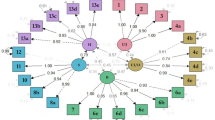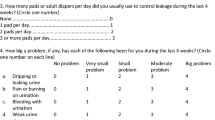Abstract
Theoretically, all patients newly diagnosed with prostate cancer are faced with a choice of treatment options: radical prostatectomy or radio therapy. Although these different treatments may have no differences in terms of survival, they may have very different consequences on the subsequent quality of life (QoL). Prerequisite to analyze QoL is a reliable and valid instrument to assess these differences not only in terms of general QoL (EORTC QLQ-C30) but prostate specific symptoms with a prostate specific module as well. Therefore, the aim of this study was a psychometric evaluation (validation) of the prostate-specific module (PSM). Five historical cohort studies were put together for an empirical meta-analysis. The main objective was to analyze the module’s psychometric properties. The total sample consisted of 1,185 patients, of whom 950 completed the QoL questionnaires (EORTC QLQ-C30 and a prostate specific module developed by Kuechler et al.). First step of analysis was a principal component analysis that revealed the following scales: urinary problems, incontinence, erectile dysfunction, sexual problems, problems with partner, pain, heat, nutrition, and psychic strain. The module showed good reliability and concurrent validity and very good construct validity, since the module is able to discriminate between different treatment regimes, tumor stages and age. The German PSM is a reliable, valid and applicable tool for QoL in patients with prostate cancer.




Similar content being viewed by others
References
Parker ME (1997) PSA thresholds for prostate cancer detection. JAMA 278(9):699–700
Tannock I (1995) Will increases in chemotherapy dose intensity improve outcome of patients with common malignancies? Am J Med 99(6A):68S–69S
Biermann CW and Küchler T, „Lebensqualität in der urologischen Onkologie” in: Herbert Rübben (Hrg.): Uroonkologie; 3.ed., Springer 2001: 917–930
Sprangers MAG, Cull A, Bjordal K, Groenvold M, Aaronson NK for the EORTC STUDY GROUP ON QUALITY OF LIFE (EORTC-QOL). The European organization for research and treatment of cancer approach to the quality of life (QOL) assessment: guidelines for developing questionnaire modules. Quality of Life Research 3:67–68, 1994
Biermann CW, Semjonow A, Hertle L, Küchler T Entwicklung eines prostata-spezifischen Moduls zu Messung von Lebensqualität nach radikaler Prostatektomie. Forum DKG Suppl. 75 (1997)
Fayers PM, Aaronson NK, Bjordal K, Curran D, and Groenvold M on behalf of the EORTC QUALITY OF LIFE STUDY GROUP. EORTC QLQ-C30 Scoring Manual: 2nd Edition” 1999, ISBN 2-930064-16-1, 78 pp
Aaronson NK, Ahmedzai S, Bergman B, et al. (1993) The European Organization for Research and Treatment of Cancer QLQ-C30: a quality-of-life instrument for use in international clinical trials in oncology. J Natl Cancer Inst 85:365–376
Staquet MJ, Fayers PM, Hays RD (eds) “Quality of life assessment in clinical trials: methods and practice” Oxford Medical Publications (1998)
Riemer B “Lebensqualitätsmessung nach HDR-Brachytherapy und Teletherapie beim lokalisierten Prostatakarzinom” Univ. Diss., Kiel (1999)
Carmines EG, Zeller RA Reliability and validity assessment, Sage Publ. (1979)
Davis JW, Kuban DA, Lynch D, Schellhammer PF (2001) Quality of life after treatment for localized prostate cancer: differences based on treatment modality. J Urol 166(3):947–952
Litwin MS, Hays RD, Fink A, Ganz PA, Leake B, Brook RH (1998) The UCLA prostate cancer index: development, reliability, and validity of a health-related quality of life measure. Med Care 36:1002–1112
Acknowledgements
This research was supported by a grant from “Deutsche Krebshilfe e.V.”
Author information
Authors and Affiliations
Corresponding author
Additional information
Supported by a grant from “Deutsche Krebshilfe e.V.”
Rights and permissions
About this article
Cite this article
Bestmann, B., Rohde, V., Siebmann, JU. et al. Validation of the German prostate-specific module. World J Urol 24, 94–100 (2006). https://doi.org/10.1007/s00345-005-0023-5
Received:
Accepted:
Published:
Issue Date:
DOI: https://doi.org/10.1007/s00345-005-0023-5




